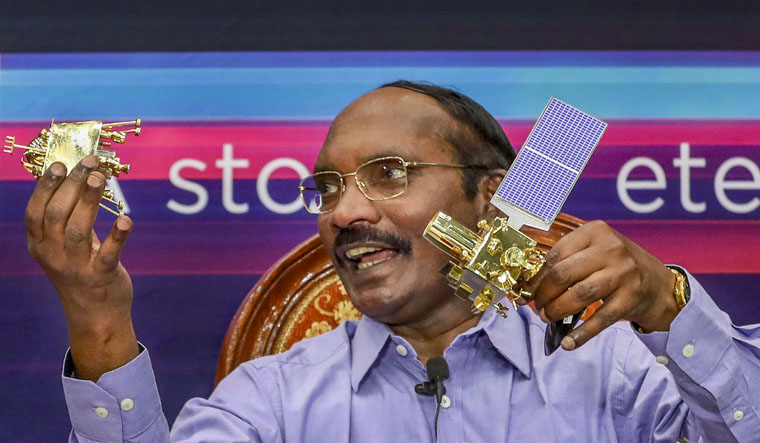ISRO chairman K. Sivan triggered debate on Saturday with his claim that the Chandrayaan-2 mission was “98 per cent successful”. The statement came two weeks after ISRO lost communication with the Vikram moon lander after it crashed on to the lunar surface.
Now, a Facebook post by a former senior scientist of ISRO on the nature of space technology is being interpreted as being veiled criticism of Sivan's style of management at ISRO. Tapan Misra was the director of the Space Applications Centre at Ahmedabad and was instrumental in designing several classes of satellites including the RISAT 'spy' craft.
The Facebook post, uploaded on September 20, by Misra is titled “Space Technology is not 'Rocket Science'.In the post, Misra explains “simplicity is the hallmark of of space technology, including 'rocket Science'”. “Space Technology may be based on complex scientific knowledge and principles. But reliability is the essence of space technology,” he argues.
Misra writes space research needs scientists to be “able to imagine all possible behaviours of spacecraft in space, in harsh and unforgiving environment,” explaining the importance of thorough simulation to deal with possible problems. He notes, “If you cannot imagine a situation of failure, you cannot make a provision to recover from anomalies in future. So the development need not be hurried through.”
The part of the long post by Misra that has generated curiosity is references to the attitude of managers. While he does not refer to ISRO or Sivan directly, Misra argues, “the most important component of space industry are its people. And it is the solemn duty of managers to treat employees as valuable assets. Bossy behaviours are absolute No No.”
Misra writes that an organisation has to have a sanskar (value system), which if compromised with, can harm an organisation to the point of no return.
Misra writes, “Leadership determines the backbone of an institution. All successful institutions have one thing in common: they choose a leader who built some thing new, chosen an untrodden path, building a new one. You become a complete leader when you pass through the stages of being ignored and ridiculed for your new ideas, grudgingly accepted when you prove your point by adding value to your institution and society at large and finally admired for what you built and what you are. Leaders inspire, they do not manage. When you see a sudden spurt in emphasis on adhering to rules, sudden increase in paper work, frequent meetings, unwinding discussions, you surely know leadership is becoming rare material in your institution...”
Misra concludes his post with the line, “No point in crying when things go wrong”. Some media groups have interpreted this as a reference to Sivan becoming emotional when meeting Prime Minister Narendra Modi after the loss of communication with Vikram.
Misra had previously written on experiences at ISRO. In a post uploaded on September 8, after the failure of Vikram, Misra narrated an incident mentioned in the autobiography of former president A.P.J. Abdul Kalam. Misra wrote after the SLV-3 space rocket failed in 1979, then ISRO chief Satish Dhawan faced the press and acknowledged the failure even though Kalam was the project director. He added after the SLV-3 was successfully launched in 1980, Kalam addressed the press, while “Dhawan stood away from limelight and set the tone of essential style of ISRO leadership...”
Sivan was subjected to some criticism soon after the failure of the Vikram mission as he did not address the press, with a subordinate being sent.
also read
- ISRO poised to launch US communications satellite Bluebird with GSLV Mk III
- India’s SpaDeX mission: Mastering the precision of autonomous space docking
- ISRO achieves milestone with 15 missions in 2024, boosts private sector participation
- From launch of NVS-02 satellite and Gaganyaan to joint NISAR mission, ISRO has a busy year ahead
Misra was director of the Space Applications Centre of ISRO from 2015 to 2018, when he was relieved of his responsibilities and transferred as an advisor to the ISRO chairman. Misra was touted to be a frontrunner to replace Sivan as head of ISRO when the latter's term ended in 2021.
Soon after Misra was transferred from SAC in July 2018, a group of 27 eminent scientists wrote a letter to the president of India about the issue. The letter referred to media reports that claimed Misra was being transferred as he opposed delays in an ongoing ISRO project and objected to plans to privatise functioning of the space agency.



